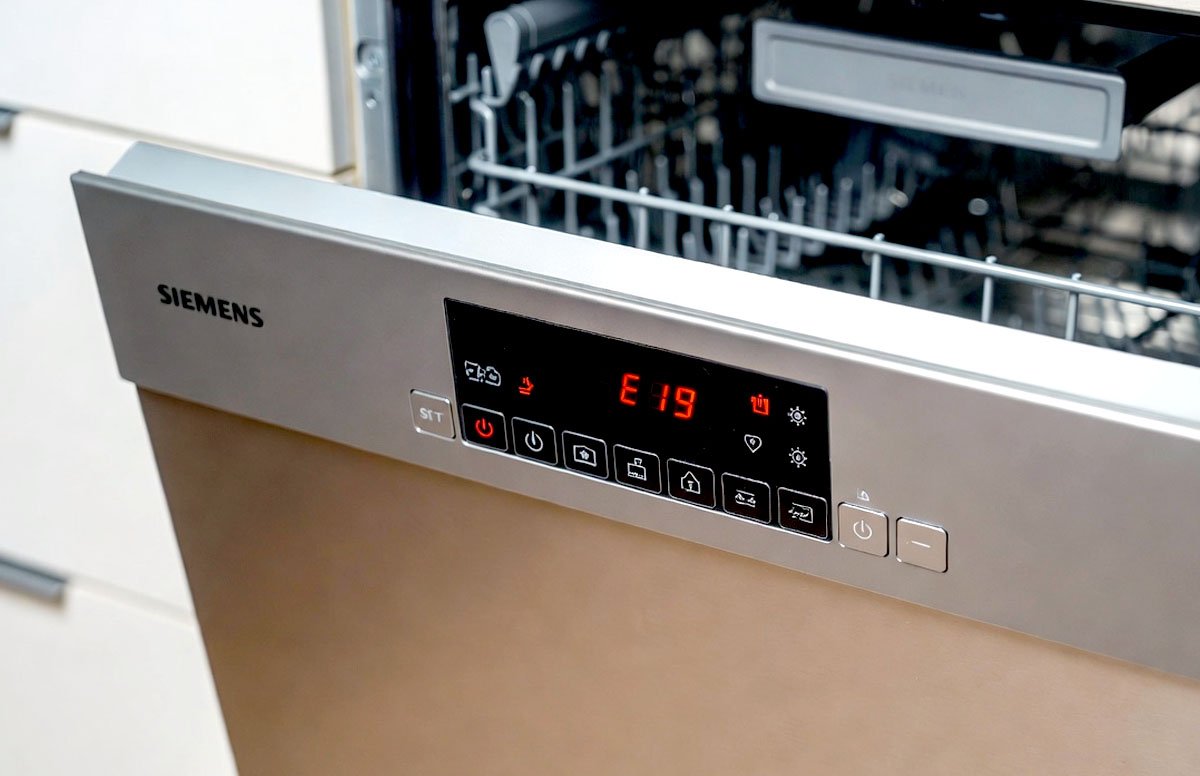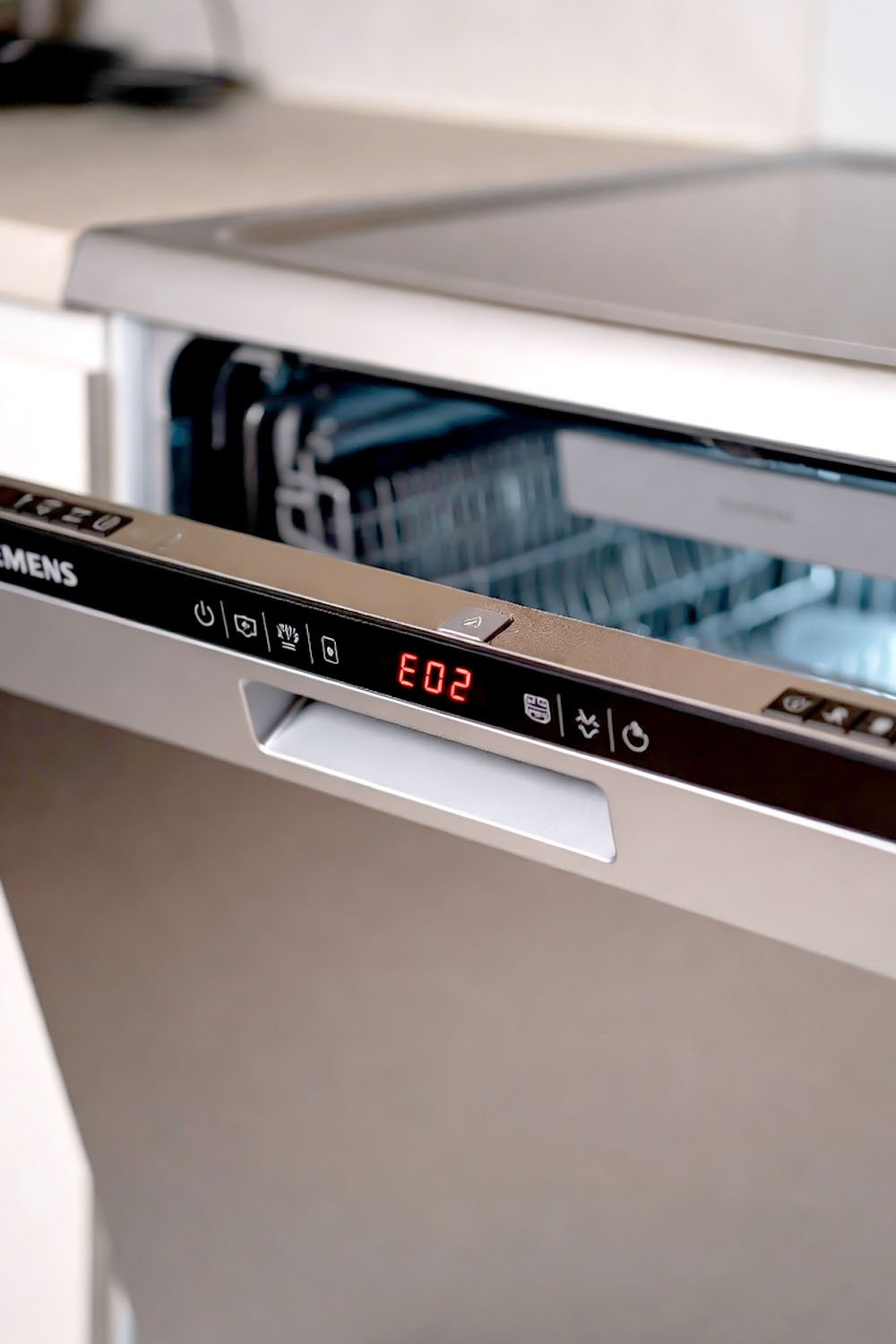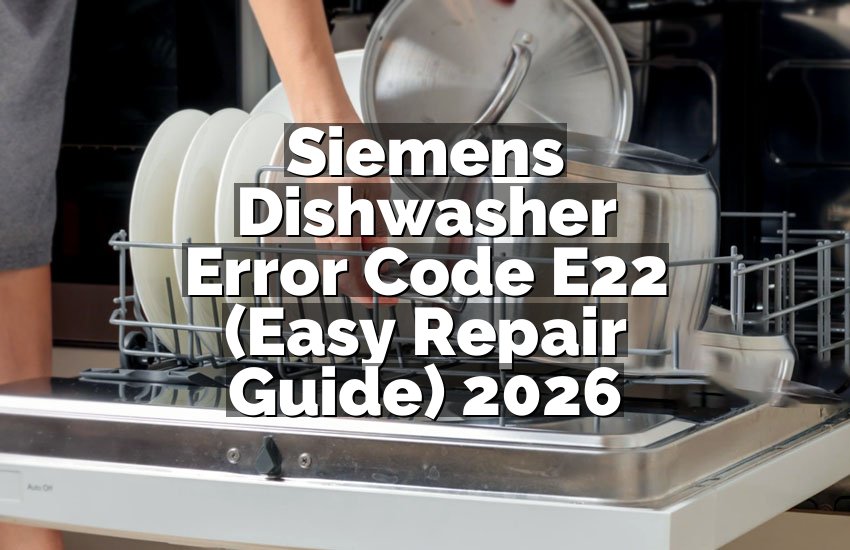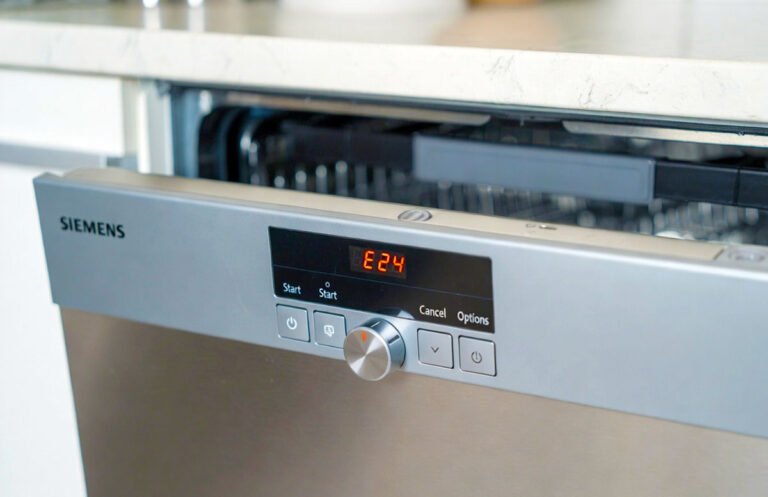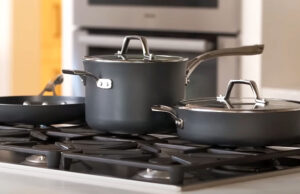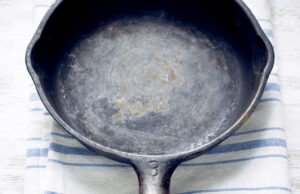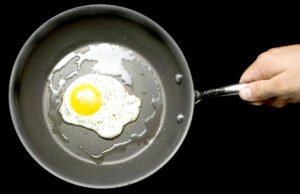As an Amazon Associate, I earn from qualifying purchases at no extra cost to you.
Does a Dishwasher Have a Filter? Learn the Real Answer Here
You probably never think much about what happens after you press the start button on your dishwasher. But one day, your dishes come out dirty or smell bad. You start wondering, Does a dishwasher have a filter? Yes, every dishwasher has a filter. It is a very important part that catches food bits and keeps your dishes clean. If it gets dirty or clogged, your dishwasher will not work well. In this article, you will learn everything you need to know about dishwasher filters in a very simple and helpful way.
Why Dishwashers Have Filters
Dishwashers clean your dishes with water and soap, but there is always leftover food stuck on plates and bowls. If there was no filter inside, all that food would go back into the water and stick on your clean dishes again. That would be really gross and not healthy. So, the filter is there to catch all those food crumbs, pieces of rice, pasta, and even bits of eggs or meat. It keeps the dirty stuff from going back on your dishes.
There are two main types of dishwasher filters: self-cleaning and manual-cleaning. The older dishwashers usually have self-cleaning filters. These use a grinder or something like a small food disposer to chop up the food. But they can be loud. The newer dishwashers usually have manual filters. You have to take them out and clean them by hand. These are much quieter but need more care.
If you do not clean the filter, it will get full of food. Then, the dishwasher water will become dirty. You might start to smell something bad when you open the door. Your dishes will have bits of old food stuck on them. And your dishwasher might not last very long because it has to work too hard.
Even if your dishwasher is brand new, it still needs its filter. Filters are not just for older machines. The filter is a key part of how it works. It helps save water and energy by letting the dishwasher reuse water during the wash cycle. Without a clean filter, the water can’t flow right, and the machine works harder and longer. That means higher bills and more wear and tear.
So yes, dishwashers do have filters. And they are very important for keeping your dishes clean, your machine running smooth, and your kitchen smelling fresh. Knowing about the filter is the first big step to better dishwashing.
- Filters catch food crumbs and stop them from sticking to dishes
- There are self-cleaning and manual filters
- Dirty filters make dishes dirty and smelly
- Filters help dishwashers work better and last longer
- Even new dishwashers need filter cleaning
Where the Filter is Located Inside the Dishwasher
When you open your dishwasher and look inside, you probably see the racks and the spinning arms. But the filter is usually hidden at the bottom, under the lower spray arm. You will have to take out the bottom rack to see it clearly. Once you remove the rack, look in the middle of the dishwasher floor. You will see a round or square cover. That is your filter.
Some filters are one piece, and some are two parts. The main part looks like a mesh cylinder or small basket. That part traps the food. Around it, there might be a flat screen or grill. That is also part of the filter system. You can twist and lift the round filter out. The flat part usually just lifts out.
If your dishwasher has a manual-cleaning filter, this is what you take out to wash. You will know it’s manual because you can remove it with your hand. If it won’t come out or has bolts, it’s probably a self-cleaning type. Those are not meant to be removed by hand. But you can still clean around them with a cloth.
Knowing where the filter is helps you check it often. You can look for big food bits or slime. If you see white or gray buildup, that means it’s time for a wash. Most people never check this part, and that’s why their dishwasher smells or leaves dishes dirty.
Sometimes there are more small filters around the bottom or in corners. It’s good to check your dishwasher manual if you still have it. Or you can search online for your dishwasher brand and model. You will find pictures or videos showing where the filters are.
So next time your dishwasher is not working right, check the filter. It only takes a minute to see, and it might save you from a big repair bill later.
- Filter is at the bottom of the dishwasher
- You need to remove the bottom rack to see it
- Manual filters can be twisted and pulled out
- Look for a mesh cylinder or flat screen
- Check your manual or online for model info
How to Clean the Dishwasher Filter
Cleaning the filter is very easy, but most people forget to do it. You don’t need any tools or special cleaners. Just your hands, some warm water, a brush, and maybe a little dish soap. Make sure the dishwasher is off and cool before you begin.
First, pull out the bottom rack and look for the filter. Twist and lift it out gently. Take it to the sink. Rinse it under warm water. Use a soft brush, like an old toothbrush, to scrub away food bits and greasy stuff. Don’t use anything sharp or rough because it might tear the mesh.
If the filter has white spots or smells bad, you can soak it in a mix of warm water and dish soap. Let it sit for 10 minutes, then rinse and scrub again. If it still smells, add a little baking soda or vinegar to the soak water.
Also, clean the flat screen or other parts of the filter system. Wipe around the area where the filter sits in the dishwasher. Food might be hiding in corners or under the spray arms.
When everything looks clean and fresh, put the filter back in. Make sure it locks into place. If it feels loose, check that you turned it the right way. Then slide the rack back in and shut the door.
You should clean your dishwasher filter at least once a month. If you cook often or don’t rinse your dishes much, do it more often. A clean filter means cleaner dishes and a happy kitchen.
- Remove the bottom rack and twist the filter out
- Rinse it under warm water and scrub with soft brush
- Soak in soapy water for bad smells or hard grime
- Clean the flat screen and area around filter too
- Do this once a month or more for best results
Signs That Your Dishwasher Filter Needs Cleaning
Sometimes, your dishwasher will give you signs that the filter is dirty. You just have to know what to look for. The first and most common sign is that your dishes come out still dirty. You might see small bits of food stuck to cups or plates, even after a full cycle.
Another big sign is a bad smell. If your dishwasher smells sour, fishy, or moldy, it probably means food is rotting in the filter. That smell can also go onto your dishes, and nobody wants that.
Water not draining well is another clue. If you open the door and see water sitting at the bottom, the filter might be clogged. It stops the water from flowing out the way it should.
Sometimes, the dishwasher will sound different. It might make strange grinding or humming noises. That could mean the filter is too full, and the motor is working too hard. It can even overheat.
Some dishwashers also show error codes or blinking lights when something is wrong. Check your manual or look up what the code means. Often, it’s just a clogged filter.
If you see any of these signs, stop using the dishwasher and clean the filter right away. Waiting too long can damage the pump or other parts inside. It can also waste water and energy.
A clean filter helps your machine run smoother, quieter, and faster. You’ll get cleaner dishes and save money on repairs.
- Dishes come out with food bits
- Dishwasher smells bad or musty
- Water sits at the bottom after wash
- Strange sounds during the cycle
- Flashing lights or error codes
Difference Between Self-Cleaning and Manual Filters
Many people don’t know there are two types of dishwasher filters. Understanding the difference helps you take better care of your machine. Self-cleaning filters are built with a small grinder or chopper. These grind up the food into tiny pieces that go down the drain. You don’t need to clean them by hand, but they are louder.
Manual filters have no grinder. They trap the food in a basket, and you have to remove and clean it yourself. They are found in most newer dishwashers because they are quieter and more energy efficient.
With a self-cleaning filter, you don’t have to do much. But sometimes, food can still build up around the grinder. So it’s a good idea to run a dishwasher cleaner or vinegar cycle once in a while.
Manual filters need more care. If you forget to clean them, they get full fast. That can cause smell, dirty dishes, and damage. But they are easy to clean and keep the dishwasher working great if you do it often.
Some people prefer manual filters because they don’t like noise. Others like self-cleaning because they don’t want to touch food bits. It depends on what you like better.
Check your dishwasher model to see what type you have. If it’s quiet and has a removable filter, it’s probably manual. If it’s older and louder, it might be self-cleaning.
- Self-cleaning filters have grinders
- Manual filters must be cleaned by hand
- Manual types are quieter and use less energy
- Self-cleaning ones need less care but are noisy
- Choose the one that fits your needs best
How to Make Your Dishwasher Filter Last Longer
Your filter can last a long time if you take care of it. That means cleaning it often and using the dishwasher the right way. First, always scrape off big food pieces before putting dishes in. You don’t need to rinse, just scrape. That helps the filter not get full too fast.
Second, don’t overload the dishwasher. If you pack in too many dishes, the water and soap can’t reach everything. That means more food is left behind, and the filter has to catch it all.
Third, run hot water in your sink before you start the dishwasher. This helps the machine start with hot water right away. Hot water cleans better and helps break down grease and food.
Fourth, use a good dishwasher detergent and follow the amount it says on the box. Too much soap can cause buildup. Also, run a cleaning cycle with vinegar or a dishwasher cleaner once a month. This helps clean the filter and inside parts too.
Finally, always check the filter every few weeks. Look for food, slime, or bad smells. Cleaning it before it gets too dirty will make it last longer and keep your machine happy.
- Scrape off big food pieces before loading
- Don’t overload the dishwasher
- Start with hot water for better cleaning
- Use the right soap and clean once a month
- Check and clean the filter often
Final Thoughts
Your dishwasher does have a filter, and it plays a big part in keeping your dishes clean and your machine working well. If you didn’t know this before, now you do! Taking care of the filter is easy, but it makes a huge difference. Clean it often, and your dishwasher will last longer, smell fresh, and give you sparkling dishes every time. Don’t wait for problems to start — check that filter today and keep your kitchen happy.
Frequently Asked Questions (FAQs)
Is it okay to run my dishwasher if the filter is dirty?
No, it’s not okay. A dirty filter can make your dishwasher work harder and give poor results. Food bits can go back on your dishes, and your dishwasher can smell bad. It can also clog the drain and damage the pump. Running it like that can shorten the life of your machine. Always clean the filter first for better cleaning and safety.
Is it hard to remove and clean a dishwasher filter?
Not at all. Most manual filters are very easy to take out. You just twist and lift. Then rinse it under warm water and scrub with a soft brush. It usually takes just 5 to 10 minutes. If it’s your first time, check your manual or search online for your model. Once you’ve done it once, it becomes a simple part of your routine.
Can a dirty filter cause bad smells?
Yes, it can. When food bits stay trapped in the filter for too long, they start to rot. That causes a sour or fishy smell inside your dishwasher. The smell can even get on your dishes and glasses. Cleaning the filter regularly stops this from happening and keeps everything smelling clean.
Can I clean the filter with vinegar or baking soda?
Yes, you can. Soaking your filter in warm water with vinegar or a little baking soda helps break down grease and remove smells. It’s a natural way to clean without harsh chemicals. You can also pour vinegar inside the dishwasher and run a hot cycle to clean the inside and the filter together.
Do I need to clean the filter even if I rinse my dishes?
Yes, even if you rinse your dishes, small food bits still get inside. Over time, they build up in the filter. Rinsing may help a little, but it does not stop the filter from getting dirty. Cleaning it once a month is still important for the best results.
Do I have to replace the dishwasher filter?
Usually, you do not need to replace it often. If you clean it regularly, it can last for years. But if it tears, cracks, or smells bad even after cleaning, then it might be time to get a new one. Always buy the right filter for your dishwasher brand and model.
Is it okay to run the dishwasher without the filter?
No, never run it without the filter. The filter keeps food bits out of the pump and drain. Without it, food can clog the system or break parts inside. It also makes the dishwasher water dirty, and your dishes will come out worse than before. Always keep the filter in place.
Do I need special tools to clean the filter?
No special tools are needed. You just need your hands, a soft brush, warm water, and maybe a little dish soap. For deeper cleaning, you can use vinegar or baking soda. You don’t need a screwdriver or anything fancy. Just be gentle so you don’t damage the filter.

